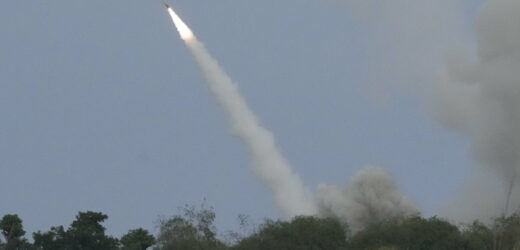Save articles for later
Add articles to your saved list and come back to them any time.
Singapore: A 61-metre navy vessel was blown up in the South China Sea on Wednesday, part of live fire exercises by the United States, Philippines and Australian militaries.
The mock attack was the culmination of large-scale war games taking place amid increasing tension over the contested waterway and the Taiwan Strait.
The US high mobility artillery rocket system fires a missile at the ship as part of a barrage of high-precision rockets, airstrikes and artillery fired in Philippine waters facing the disputed South China Sea. Credit: AP
Philippine President Ferdinand Marcos jnr was on hand to witness the destruction of his navy’s decommissioned corvette off the coast of Luzon island before a planned trip to Washington to meet with US President Joe Biden.
The destruction was the most visual demonstration yet of the reinforced security ties between the two nations under Marcos, a development that has been criticised by Beijing as stoking regional competition.
It was also a first for the annual Balikatan training exercise between the two countries – this year it was the biggest in decades, involving 17,600 troops, including a contingent of 111 Australians.
Positioned less than 200 kilometres from the Scarborough Shoal, which was seized by China in 2012, the target ship was hammered with artillery gunfire from frigates as well as rockets and bombs from fighter jets and attack helicopters.
Philippine troops fire shots during the Balikatan military exercises on Wednesday.Credit: AP
It’s a scenario the Philippines hopes to avoid for real, but it is preparing for anyway. Marcos, who came to power last year, is adding weight to the partnership with long-time treaty ally the US.
He has granted American forces access to four more military bases under the countries’ Enhanced Defence Co-operation Agreement, bringing the number of facilities they can use there to nine. They include bases facing the contested South China Sea, where Beijing has staged a military build-up, and Taiwan.
The proximity of the South-East Asian archipelago to regional flash points could make it particularly vulnerable in the event of a conflict, and Marcos has indicated he will also be seeking reassurances from Biden when he visits him at the White House on Monday.
“It [the treaty] needs to adjust because of the changes in the situation we are facing in the South China Sea, Taiwan, North Korea,” Marcos said in a radio interview this week.
“The situation is heating up.”
Of the US-Philippines relationship, he also said: “What is our partnership? What can be done to tone down or reduce rhetoric? Because there has been an exchange of heated words.”
Most notable were comments in a speech last week by Huang Xilian, the Chinese ambassador in Manila, suggesting The Philippines should oppose Taiwan’s independence unequivocally if it cares about the 150,000 Filipino workers living on the island.
While he later claimed he was taken out of context, the remarks were met with alarm.
Philippine President Ferdinand Marcos jnr waves beside a US M142 high mobility artillery rocket system at the drills on Wednesday.Credit: AP
Marcos has since met with Chinese Foreign Minister Qin Gang, who was visiting Manila at the weekend, and said afterwards his government was looking to improve communications to avoid escalation, including as a result of incidents in the South China Sea.
“We are currently working on that and are awaiting the Chinese response, and we are confident that these issues would be worked out that would be mutually beneficial for both our nations,” Marcos said.
“It was really useful that we were able to speak with Minister Qin Gang, so we can talk directly to one another and iron things out. Some of the pronouncements that have been made recently by our two countries and many other countries might be misinterpreted.”
China has argued the US will use its additional access to Philippine bases to interfere in the Taiwan Strait and for its own geopolitical purposes.
The Philippines is adamant that the deepening links are just about protecting itself.
“On a clear day, from the northernmost part of the country, you can see Taiwan,” Manuel Romualdez, the Philippine ambassador to the US, told Reuters. “So that’s how close it is.
“Obviously it will affect us … if anything happens in Taiwan, everybody will be affected, most especially in the ASEAN region, but the whole world.
He added in the interview with the news agency that the Philippines did not want China to “feel that we are out on an offensive because of our relationship with the United States … everything that we’re doing is purely for the defence of our country.”
– with Reuters and Bloomberg
Most Viewed in World
From our partners
Source: Read Full Article





